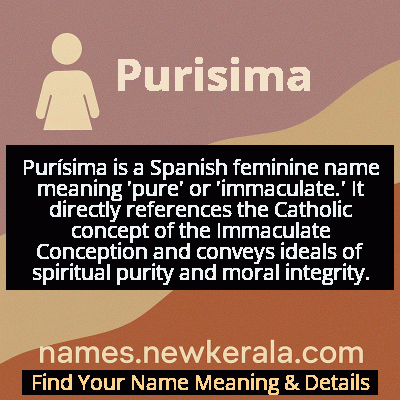Purisima Name Meaning & Details
Origin, Popularity, Numerology Analysis & Name Meaning of Purisima
Discover the origin, meaning, and cultural significance of the name PURISIMA. Delve into its historical roots and explore the lasting impact it has had on communities and traditions.
Name
Purisima
Gender
Female
Origin
Spanish
Lucky Number
7
Meaning of the Name - Purisima
Purísima is a Spanish feminine name meaning 'pure' or 'immaculate.' It directly references the Catholic concept of the Immaculate Conception and conveys ideals of spiritual purity and moral integrity.
Purisima - Complete Numerology Analysis
Your Numerology Number
Based on Pythagorean Numerology System
Ruling Planet
Neptune (Ketu)
Positive Nature
Intuitive, analytical, spiritual, and inquisitive.
Negative Traits
Secretive, reserved, aloof, and can be overly critical.
Lucky Colours
Green, yellow.
Lucky Days
Monday.
Lucky Stones
Cat’s eye, moonstone.
Harmony Numbers
1, 5, 6.
Best Suited Professions
Scientists, researchers, spiritual leaders, detectives.
What People Like About You
Depth of knowledge, analytical skills, spirituality.
Famous People Named Purisima
Purísima de la Concepción
Religious Figure
Spanish nun known for her devotion and charitable works
Purísima Salas Larrazábal
Educator
Pioneering Spanish educator who established schools for underprivileged children
Purísima Alba
Artist
Spanish painter known for her spiritual and symbolic artwork
Purísima García
Community Leader
Influential figure in Spanish-American community organizing
Name Variations & International Equivalents
Click on blue names to explore their detailed meanings. Gray names with will be available soon.
Cultural & Historical Significance
The name gained particular prominence during the Spanish colonial period, when missionaries often gave indigenous converts Christian names that reflected virtues and religious concepts. Purísima became a popular choice for girls born around December 8th, the Feast of the Immaculate Conception, and in regions with strong Marian devotion. In some Latin American countries, the name is associated with specific local manifestations of the Virgin Mary, such as La Purísima in Nicaragua, where elaborate celebrations honor this aspect of the Virgin. The name continues to serve as a living connection to centuries of Spanish Catholic heritage and the artistic, literary, and theological traditions surrounding the Immaculate Conception.
Extended Personality Analysis
Women named Purísima are often perceived as having a calm, dignified presence and strong moral compass. They tend to be principled individuals who value honesty, integrity, and purity in both thought and action. Many exhibit a natural grace and refinement, often approaching life with a sense of purpose and spiritual depth. Their name's meaning can influence their self-perception, leading them to strive for moral excellence and clarity in their relationships and endeavors.
These individuals typically possess strong intuitive abilities and emotional intelligence, allowing them to navigate complex social situations with wisdom and compassion. They often serve as moral anchors within their families and communities, offering guidance and support during difficult times. While they may appear reserved initially, they form deep, meaningful connections with those they trust. Their commitment to their values makes them reliable and trustworthy friends, though they can be uncompromising when it comes to matters of principle. The name's association with purity often translates into a personality characterized by sincerity, transparency, and a desire for harmony in all aspects of life.
Modern Usage & Popularity
In contemporary times, Purísima remains a traditional name primarily used in devout Catholic families, particularly in Spain and Latin American countries. While its usage has declined compared to previous centuries, it maintains cultural relevance in religious communities and among families wishing to honor Marian devotion. The name is most commonly given to girls born around December 8th, the Feast of the Immaculate Conception, and in regions with strong historical ties to Spanish Catholicism. Modern parents may choose the shortened form 'Pura' for everyday use while maintaining the full name for formal occasions. The name's strong religious connotations make it less common in secular contexts, but it continues to be appreciated for its historical significance and elegant sound. Recent years have seen a slight resurgence in traditional Spanish names, though Purísima remains relatively rare compared to more popular Marian names like María or Concepción.
Symbolic & Spiritual Meanings
Symbolically, Purísima represents the ideal of spiritual purity, moral integrity, and divine grace. It evokes images of clarity, innocence, and untainted beauty—both in physical and metaphysical senses. The name carries connotations of protection and divine favor, reflecting the Catholic belief in Mary's special status as free from original sin. In a broader sense, it symbolizes the human aspiration toward moral perfection and the possibility of transcending earthly imperfections. The name also represents cultural continuity, connecting modern bearers to centuries of Spanish Catholic tradition and the artistic, literary, and theological heritage surrounding the Immaculate Conception doctrine. Metaphorically, Purísima suggests a state of being untouched by corruption, maintaining one's essential goodness despite life's challenges, and serving as a source of inspiration and moral guidance to others.

